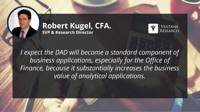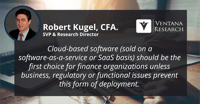One of the oddities of corporate management is that, as a rule, nobody oversees managing profitability. CEOs are accountable for meeting company-wide financial targets and assign responsibility for achieving profitability levels to business unit owners across and down an organization. Sales quotas designed to achieve revenue goals are put in place, and budget owners have cost and margin objectives. But setting profitability objectives is not the same as managing profitability.
Read More
Topics:
Office of Finance,
Sales Performance Management (SPM),
Financial Performance Management,
Price and Revenue Management,
Digital Commerce,
Predictive Planning,
Subscription Management
In preparing this research note I took the precaution of searching “value-based planning” to see what came up. Over the years, the term has been used in several contexts each with different shadings. By my definition it’s an approach to planning and budgeting that maximizes the long-term value of an organization by considering all its objectives – not just the financial targets. Value-based planning is a more effective management tool for executives because it defines objectives in terms of...
Read More
Topics:
Office of Finance,
Financial Performance Management,
Predictive Planning
Enterprise resource planning (ERP) systems are central to nearly every organization’s management of operational and financial business processes. They are essential to the smooth functioning of an organization’s record keeping, accounting and finance tasks. In manufacturing and distribution, ERP manages inventory and logistics. Some ERP software vendors incorporate an extended set of capabilities that include managing human resources as well as supply chains and logistics. In the 2020s,...
Read More
Topics:
Office of Finance,
Financial Performance Management,
ERP and Continuous Accounting,
robotic finance,
Predictive Planning,
AI & Machine Learning
An important recent development in software designed for the Office of Finance is the addition of what we’re calling a data aggregation device (DAD) for analytical applications. A DAD automates the collection of data from disparate sources using, for example, application programming interfaces (APIs) and robotic process automation (RPA). With a DAD, users of the analytical application have immediate access to a much broader data set; one that incorporates operational as well as financial data...
Read More
Topics:
Office of Finance,
Analytics,
Business Intelligence,
Data,
Financial Performance Management,
Price and Revenue Management,
robotic finance,
Predictive Planning,
AI & Machine Learning
A great deal has changed in how finance and accounting departments operate since the start of 2020. To cope with unprecedented conditions, many departments have found that significant changes to their processes and operating methods are not only possible, they’re necessary. With workers unable to be in office, organizations have learned how to work virtually using videoconferencing, and adopted a variety of new software that make it possible to work under any conditions. Software that automates...
Read More
Topics:
Office of Finance,
Financial Performance Management,
robotic finance,
Predictive Planning
One of the challenges of being a practically minded technology analyst is squaring the importance of “the next big thing” with the reality of what most organizations are doing. For decades it’s been the case that “the next big thing” in the world of information technology is easily several years ahead of where most organizations are in their use of technology. And before most organizations can realize the benefit of some whiz-bang technology, they frequently need to address a range of more...
Read More
Topics:
Human Capital Management,
Marketing,
Office of Finance,
Analytics,
Business Intelligence,
Sales Performance Management,
Financial Performance Management,
Price and Revenue Management,
Digital Marketing,
Work and Resource Management,
Digital Commerce,
Operations & Supply Chain,
Enterprise Resource Planning,
ERP and Continuous Accounting,
robotic finance,
Predictive Planning,
revenue and lease accounting,
Subscription Management,
intelligent sales,
AI & Machine Learning
Workiva recently introduced Chains, a visual workflow tool for the Workiva platform. Individuals use Chains to create and manage linear sequences of tasks that they otherwise would have to execute manually, for example, automatically updating a report with the most current dataset. Chains is like old-style Excel macros in its simplicity; users configure sequences with a drag-and-drop visual interface. There’s nothing to code and it’s easy to follow the sequence and the logic that drives the...
Read More
Topics:
Office of Finance,
Financial Performance Management,
ERP and Continuous Accounting,
Reporting, XBRL, iXBRL, document management
Recent events are forcing corporations to adopt dedicated software for tax provision, transfer pricing and tax analysis. The fiscal damage that the global pandemic is inflicting on countries is likely to result in a more aggressive tax enforcement environment. This will further pressure organizations to establish centralized control and oversight in managing income taxes in corporations. This will also require visibility into tax processes by senior executives, especially for the CFO. Dedicated...
Read More
Topics:
Office of Finance,
Financial Performance Management,
ERP and Continuous Accounting,
tax; tax provision; transfer pricing
In a recent note on virtualizing the close, I observed that finance and accounting organizations that can operate in a virtual mode are better able to adapt to changing circumstances and overcome obstacles. Having systems that people can readily access remotely to collaborate and execute processes virtually makes it easier for departments to meet their commitments with confidence. The core technology underpinning the ability to work in a virtual mode is the cloud. That’s because the cloud...
Read More
Topics:
Office of Finance,
Financial Performance Management,
ERP and Continuous Accounting,
Predictive Planning
Sometimes it takes a while for technology to fundamentally change how work is done. That’s because several innovations usually have to come together before a transformation can occur. For instance, Karl Benz created the first practical motorcar in 1885, but consumers would have to wait until the 1920s for the modern automobile. Computerized accounting systems originated in the 1950s but it’s only now that technologies have evolved and come together to fundamentally change how work is done.
Read More
Topics:
ERP,
Office of Finance,
close,
closing,
CFO,
controller,
Financial Performance Management,
ERP and Continuous Accounting



















